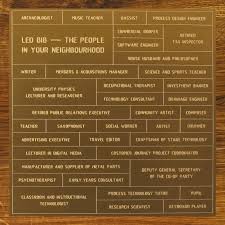The UK jazz scene has been an incredibly fertile ground of late, with excellent new releases from Polar Bear, Sons Of Kemet and Get The Blessing. Now Led Bib bring their own contribution, celebrating their tenth year with the two of their strongest releases to date – the crowd funded studio album The People In Your Neighbourhood and the limited edition live vinyl release The Good Egg.
Formed by drummer and band leader Mark Holub whilst he was studying at Middlesex University in 2003, with the fiery yet melodic twin alto saxophone interplay of Pete Grogan and Chris Williams, versatile keyboards from Toby McLaren and compellingly hypnotic double bass of Liran Donin, Led Bib have perfectly honed their craft over their decade together, to the point where their incendiary nature of their live performances has finally struck a perfect balance with their studio work. The resultant album is a near flawless blend of instantly memorable composed tunes and the kind of wild improvisation-informed ‘out’ sections that only really falls into place when a band has an extensive history of live performances to draw upon.
Whilst the band’s previous two releases, 2009’s Sensible Shoes and 2011’s Bring Your Own, both showed progression in this direction and were wonderful in their own right, TPIYN outdoes them both and pretty much everyone else currently making this kind of music. In turn, The Good Egg, which features three songs from the new album and one from its predecessor, offers irrefutable evidence of the band’s live prowess. Like the very best of the genre, the Arkestra or Chris McGregor’s Brotherhood Of Breath for example, this is music that swings and also destroys – whose inherent sense of chaos informs and helps define its strong melodic content. This is no simple retread of 70s jazz-rock tropes, however, but rather a distillation of the genre’s best ideas presented in a direct and accessible modern fashion. Judging by my 9-year-old daughter’s fondness for the album and the fact that she has requested joining me at one of their upcoming Vortex shows, its an approach that’s really reaping dividends.
Opening track ‘New Teles’ is as succinct and powerful a statement of intent as has ever been uttered in the modern jazz-rock idiom, combining a hooky saxophone riff with stretched out sine-wave synth oscillation and Holub’s incredibly effervescent krautrock-informed drumming. As anyone who has caught the band performing will attest, whilst none of the band hold back in contributing to their glorious live harmolodic squall, there is definitely something special in the way Holub hits those skins that really gives their music the kind of cosmic, trance-inducing edge of Tago Mago era Can, or even early Hawkwind. ‘Giant Bean’ further mines this space/jazz rock territory, beginning with delirious meltdown of twin alto sax and distorted Fender Rhodes piano before eventually coalescing into a beautifully uplifting melody at its end. ‘Angry Waters (Lost To Sea)’, one of two tracks composed by bassist Donin, initially seems a little incongruous for its sudden reduction in pace but reveals itself as it progresses, through ecstatically ascending piano and joyously swooping interwoven saxophone calls, to be one of the album’s true highlights. Perhaps more than anything else on TPIYN, this track is a masterclass in how to stretch and build a killer melody that really hits home when it finally comes together, of how to effect great lyrical beauty without sacrificing the band’s all-too-important edge. Holub’s ‘Recycling Saga’ is yet another slowly building highlight, especially so considering the incredible live rendering it is given on The Good Egg, which highlights the band’s ability to access the deepest reaches of far-out kosmiche space without losing sight of the song’s sonic architecture.
Following immediately after, Plastic Lighthouse is my favourite track, equally alongside ‘Angry Waters’. Kicking off with a bouncing upbeat melody that recalls the other reference contained within the album’s title, Sesame Street, (the first being the fans who generously stumped up the £10,000 that funded the project, and whose range of professions inspired the album’s cover), the track effortlessly deconstructs its own big-band style swagger over its six minute running time, its initial melody teasingly transforming itself via all manner of twist and turns effortlessly playing out its inherent possibilities.
The remaining five tracks don’t have a slack moment among them, and although the album could have possessed more punch had it been shorter, it’s more likely that its length will simply mean continued discovery of further favourites with listening. The final track and second by Donin, ‘Orphan Elephants,’ brings yet another change of style and pace by introducing an initial dub-like quality, subdued middle section and triumphantly epic ending. All things considered, these are two essential, complimentary releases from a band totally on top of their game and my personal albums of the year so far. Anyone who cares about this kind of passionate, brilliantly composed and performed music should thank their lucky stars that there are such people in our neighbourhood as Led Bib.


